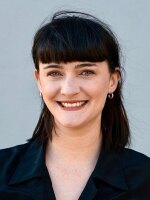Eddie Reynoso was welcoming guests to Rich's San Diego in May when someone shot him in the eye with a pellet gun.
“It was too dark and it happened too fast and unexpected for any of us, or any of the dozens of people that they drove past, to even catch the license plate number,” he said. “We couldn't even make out the car model.”
Citing an increase in hate crimes in the neighborhood, the San Diego Police Department plans to install additional surveillance cameras and license-plate readers in Hillcrest in the coming weeks without prior approval from the full city council. San Diego Police Chief Scott Wahl said waiting for city council approval wouldn't give police enough time to install the cameras before the Pride parade on July 20. But privacy advocates said police are bypassing an important public process.
The San Diego City Council approved the use of streetlight surveillance cameras last summer. But once police started installing them, they found that some of the 500 planned locations had infrastructure issues, like lampposts not having the proper voltage or buildings blocking the camera view. That left the department with extra cameras.
Wahl said he wants to put 14 of those leftover cameras in Hillcrest.
“This neighborhood we’re standing in today has seen, over the last four years, the most incidents of hate throughout our entire city,” Wahl said. “Today, we’re saying enough is enough.”
New locations would usually have to go through the city council, but since it can take several weeks to install them, Wahl said they need to start the process now. Most of the 14 new locations are on University Street, the site of the Pride parade and Pride 5K scheduled for July 20.
“We’ll be in front of city council for full approval on July 23,” he said. “Unfortunately, the timeline for approval and the times for the Pride parade and the instances that continue to happen here in this community don't align.”
Wahl said he’s citing part of the city’s surveillance technology ordinance that allows for its use during “an emergency involving danger of death or serious physical injury to any individual, or imminent danger of significant property damage.”
But privacy advocates say the police department is bypassing a city process that allows for community input. Outside Rich's on Monday, they chanted and waved signs. One read, “No community input nor council oversight.” Another read, “Surveillance is a threat, not protection.”
“A lot of people worked really hard to make sure that there was transparency and accountability,” said Blair Overstreet. “Instead, the police department has used the safety of queer people to leverage, to be able to put up these video cameras everywhere and to record what we do.”
Wahl said police would remove the cameras if the city council doesn’t approve the locations later this month.
The City Council’s Public Safety Committee is set to discuss the camera locations on Wednesday.






